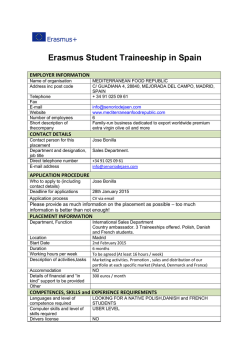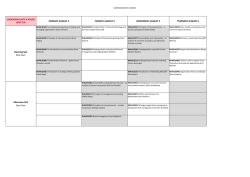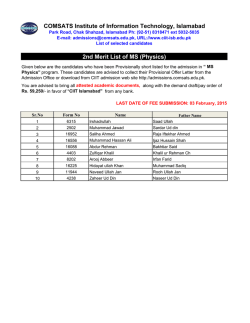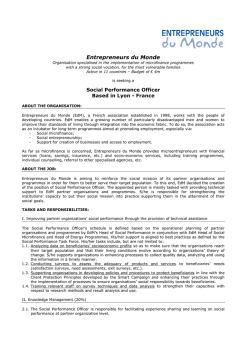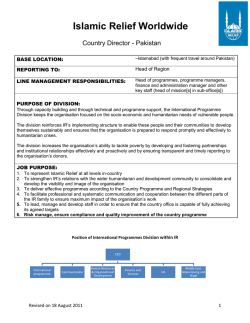
Generel information om optagelse
General Information Admission to Higher Education Programmes 2015 1 Contents 1. Preface ............................................................................................................................................................ 3 2. Rules of applications for admission to higher education programmes ................. 3 3. New higher education programmes ............................................................................................. 3 4. Special grade requirements for a number of higher education programmes .. 3 5. Introduction of changes in specific requirements .............................................................. 7 6. Danish and English language requirements ......................................................................... 11 7. Final grade point average for guaranteed admission to certain higher education programmes ............................................................................................................................ 11 8. Bonus for early study start .............................................................................................................. 11 9. Conditional admission ......................................................................................................................... 12 10. Tuition fees at recognized Danish full-time programmes......................................... 13 11. Supplementary courses at upper secondary level ........................................................ 13 12. Admission tests and interviews ................................................................................................. 14 13. Admission every other year ......................................................................................................... 14 14. Study start summer or winter .................................................................................................... 14 15. Disclaimer concerning lack of applicants on certain programmes...................... 14 2 1. Preface In “General Information - Admission to Higher Education Programmes 2015” you will find useful information regarding admission to higher education in 2015. Applying for higher education programmes by using Optagelse.dk is mandatory and besides the information here, you can find guides at Optagelse.dk, were you can learn more about how to fulfil an application. You will find the entry requirements for each higher education programme 2015 at the programme presentation for each programme at Optagelse.dk. You will also find information about any specific entry requirements as well as any local requirements required by the educational institution. Holders of foreign qualifications can learn more about admission to higher education in Denmark at http://ufm.dk/recognition/entry You will also find information regarding future changes in the entry requirements concerning specific programmes at the admission 2016. 2. Rules of applications for admission to higher education programmes The legislation on admission to higher education programmes are stated in different orders. Please find more information on the websites of the educational institutions and at studyindenmark.dk. The orders can be found on retsinformation.dk (Danish only): Bachelor Programmes at universities: Bekendtgørelse om adgang til bacheloruddannelser ved universiteterne (bacheloradgangsbekendtgørelsen). Professional Bachelor and Academy Profession Programmes: Bekendtgørelse om adgang til erhvervsakademiuddannelser og professionsbacheloruddannelser. Artistic and Cultural Education Programmes: Bekendtgørelse om adgang til kunsthåndværkeruddannelser og bacheloruddannelser ved de videregående kunstneriske uddannelsesinstitutioner. 3. New higher education programmes On the website ug.dk you will find a list of all the new programmes in 2015 (Danish only). 4. Special grade requirements for a number of higher education programmes In addition to the specific entry requirements, a few of the higher education programmes require that you have passed your upper secondary education 3 with a specific minimum final grade point average or that specific courses have been passed with a specific minimum grade higher than the grade of 2.0 (Danish 7-point grading scale). For the 2015 admission, the following programmes have special grade requirements (Danish 7-point grading scale). Please note that all the levels refer to the name of the levels in the Danish upper secondary education. University Programme Special grade requirements University of Copenhagen Økonomi The average of the grade point average for level A in mathematics and the final grade point average according to the diploma for the upper secondary education/ entry qualifying exam must be at least 6.0 University of Copenhagen Veterinærmedicin The final grade point average according to the diploma for the upper secondary education/entry qualifying exam must be at least 6.0 University of Copenhagen Farmaci Either: The final grade point average according to the diploma for the upper secondary education/entry qualifying exam must be at least 6.0 Or: The average of the grades obtained in level A in mathematics, either level B in physics or level A in Earth Sciences and either level B in chemistry or level A in biotechnology must be at least 6.0 University of Copenhagen Fødevarer og ernæring The final grade point average according to the diploma for the upper secondary education/entry qualifying exam must be at least 4.0 University of Copenhagen Biologibioteknologi The final grade point average according to the diploma for the upper secondary education/entry qualifying exam must be at least 6.0 Copenhagen Asian Studies Level A Chinese with a minimum 4 Business School Programme (Chinese/English) grade point average of 6.0 Copenhagen Business School Asian Studies Programme (Japanese/English) Level A Japanese with a minimum grade point average of 6.0 Copenhagen Business School Business Language and Culture (SPRØK) (English) If the second foreign language chosen is French at continued level (B level) or German at continued level (B level), the grade point average must be at least 6.0 in the subject chosen Copenhagen Business School Erhvervsøkonomi-virksomhedskommunikation, HA (kom.) Level A in Danish with a minimum grade point average of 6,0 IT University of Copenhagen Softwareudvikling Level A in mathematics with a minimum grade point average of 6.0 and level B in english with a minimum grade point average of 6.0 IT University of Copenhagen Digitale medier og design Level A in mathematics with a minimum grade point average of 6.0 and level B in english with a minimum grade point average of 6.0 IT University of Copenhagen Global Business Informatics Level A in mathematics with a minimum grade point average of 6.0 and level B in English with a minimum grade point average of 6.0 University of Southern Denmark Farmaci Either: The final grade point aver-age according to the diploma for the upper secondary education/entry qualifying exam must be at least 6.0 Or: The average of the grades obtained in level A in mathematics, either level B in physics or level A in Earth Sciences and either level B in chemistry or level A in biotechnology must be at least 6.0 VIA University Professional Each of the following subjects must 5 College Bachelor Programme, Bandagist/ ortopædiingeniør be passed with a minimum grade point average of 4.0: Level A in mathematics, level C in english, either level A in biotechnology or level C in chemistry and either level A in earth sciences or level B in physics. All University Colleges Professional Bachelor Programme, Folkeskolelærer The grade point average must be passed with no less than 7,0. If not, admission can only be granted on the basis of an admission test. After admission specific entry requirements apply depending on the applied courses, cf. bekendtgørelsen om uddannelsen til professionsbachelor som lærer i folkeskolen. 6 5. Introduction of changes in specific requirements Please note that all the levels refer to the name of the levels in the Danish upper secondary education. New grade requirements introduced from 2016: Language and International Studies, English, University of Aalborg The final grade point average according to the diploma for the upper secondary education/entry qualifying exam must be at least 4.0 International Virksomhedskommunikation, University of Aalborg The final grade point average according to the diploma for the upper secondary education/entry qualifying exam must be at least 4.0 Other local requirements introduced from 2016: Diplomingeniøruddannelserne (exept from di- Level B or equal qualifications in English plomingeniør, eksport og teknologi samt diplomingeniør, stærkstrøm), The Technical University of Denmark 7 New grade requirements introduced from 2017: Biomedicin University of Southern Denmark Applicants must fulfil one of the following grade requirements: 8,0 in grade point average from the upper secondary exam/entry qualifying exam 8,0 in average from one of the following programme combinations: o Mathematics A, Physics B and Chemistry B o Mathematics A, Physics B and Biotechnology A o Mathematics A, Geosciences A and Chemistry B o Mathematics A, Biology A, Physics C and Chemistry B Biokemi og Molekylær Biologi University of Southern Denmark Applicants must fulfil one of the following grade requirements: 8,0 in grade point average from the upper secondary exam/entry qualifying exam 8,0 in average from one of the following programme combinations: o Mathematics A, Physics B and Chemistry B o Mathematics A, Physics B and Biotechnology A o Mathematics A, Geosciences A and Chemistry B 8 Biologi University of Southern Denmark Applicants must fulfil one of the following grade requirements: 7,0 in grade point average from the upper secondary exam/entry qualifying exam 7,0 in average from one of the following programme combinations: o Mathematics A, Physics B and Chemistry B o Mathematics A, Physics B and Biotechnology A o Mathematics A, Geosciences A and Chemistry B o Mathematics A, Biology A, Physics C and Chemistry B Farmaci University of Southern Denmark Applicants must fulfil one of the following grade requirements: 8,0 in grade point average from the upper secondary exam/entry qualifying exam 8,0 in average from one of the following programme combinations: o Mathematics A, Physics B and Chemistry B o Mathematics A, Physics B and Biotechnology A o Mathematics A, Geosciences A and Chemistry B o Mathematics A, Biology A, Physics C and Chemistry B 9 Fysik University of Southern Denmark Applicants must fulfil one of the following grade requirements: 8,0 in grade point average from the upper secondary exam/entry qualifying exam 8,0 in average from one of the following programme combinations: o Mathematics A, Physics A and Chemistry B o Mathematics A, Physics A and Biotechnology A o Mathematics A, Physics B and Chemistry A o Mathematics A, Geosciences A and Chemistry A Kemi University of Southern Denmark Applicants must fulfil one of the following grade requirements: 8,0 in grade point average from the upper secondary exam/entry qualifying exam 8,0 in average from one of the following programme combinations: o Mathematics A, Physics A and Chemistry B o Mathematics A, Physics A and Biotechnology A o Mathematics A, Physics B and Chemistry A o Mathematics A, Geosciences A and Chemistry A Datalogi University of Southern Denmark Applicants must fulfill both of the following grade requirements: 7.0 in grade point average from the upper secondary exam/entry qualifying exam 7.0 in Mathematics A 10 6. Danish and English language requirements Danish language requirement When applying for a higher education programme taught in Danish the educational institutions may require that applicants are able to document their Danish language skills. The educational institution may require that some nonDanish applicants or applicants with entry qualifications from outside Denmark has passed ”Studieprøven” or similar – before starting on the programme. Some educational institutions also require that “Studieprøven“ is passed with a certain minimum grade. Check the website of the educational institution that you are considering applying for. English language requirement When applying for a higher education programme taught in English or of which significant parts are offered in English, the educational institution requires that applicants document that their English language skills corresponds to a Danish level B as a minimum. Please note for some programmes English skills corresponding to a Danish level A is required. Check the website of the educational institution that you are considering applying for. 7. Final grade point average for guaranteed admission to certain higher education programmes Some educational institutions have certain grade point averages for guaranteed admission to some of their bachelor programmes. A grade point averages for guaranteed admission means that the educational institution has specified a minimum final grade point average which guarantees an offer for admission. If you have obtained this final grade point average or higher, you will be offered a study place if you apply for admission and otherwise fulfil the entry requirements for the programme. On the programmes at Optagelse.dk you can learn if the programme that you want to apply for has a final grade point average for guaranteed admission. Ask the educational institution for further information on grade point averages for guaranteed admission. 8. Bonus for early study start For the 2015 enrolment, applicants applying for admission in quota 1 will have their final grade point average multiplied by 1.08 if they have completed their upper secondary education in 2013, 2014 or 2015 and if their grade point average can be converted to the Danish 7-point grading scale. 11 Applicants who have completed their upper secondary education in 2009 and onwards and who are unable to start on a programme before the expiry of the two-year deadline can have this deadline extended by up to four years due to the following documented circumstances: 1. National service in the Danish Defence, including service on national service-like terms. 2. Training and education with a view to deployment as well as deployment on international operations for the Danish Defence. 3. Adoption or maternity/paternity leave. 4. Long-term illness, including specific circumstances related to a disability. 5. Caring for close relatives and other related persons who are disabled, seriously ill or dying 6. Training for and participation in the Olympic Games or Paralympic Games as an elite or world-class athlete appointed by Team Danmark The application for extension and the documentation must be uploaded and enclosed to the application for admission at www.optagelse.dk. If the applicant’s final grade point average has not been awarded according to the Danish 7-point grading scale, the adjustment will take place after conversion of the grade point average to the 7-point grading scale. 9. Conditional admission It is possible to apply for conditional admission to some programmes even though you have not passed a level in a subject or do not fulfil a grade requirement, if any. Some educational institutions will grant you conditional admission, which means that you are guaranteed admission to the programme once you have passed the supplementary courses. The conditional admission depends on whether you can pass the supplementary courses in time. However, you must have completed the supplementary courses prior to the study start of the programme or immediately thereafter as indicated by the educational institution. If, for example, you have mathematics at Danish level B and the programme requires mathematics at Danish level A, you may supplement the level taking a supplementary course at upper secondary level during the summer holidays. You must have completed both the course and tests prior to study start on 1 September or immediately thereafter. The same applies if you are required to have obtained specific grades to fulfil the entry requirements. Your final admission and your right to start/continue on the programme are, however, on the condition that you pass the necessary exams on the required level or with a required grade prior to the study start or immediately thereafter. Please note you will lose your study place if you do not pass the supplementary course(s). You should thus apply for conditional admission as usual 12 by the admission deadlines. It is your responsibility to apply for admission to a supplementary course. Please note that the offering of certain supplementary courses is limited to very few schools, and that most of the courses offered in Denmark are taught in Danish. For some programmes it is required that you submit documentation before 5 July 2015 at noon showing that you are registered for supplementary courses at upper secondary level. The possibility of applying for conditional admission does not apply to all programmes. For some programmes with restricted admission, conditional admission is only granted if you need to improve one subject by one level only. You should ask the coordinators of the supplementary courses at upper secondary level or enquire at the educational institution to which you are applying for admission. You can find further information on the individual programmes, entry requirements etc. at optagelse.dk and ug.dk. 10. Tuition fees at recognized Danish full-time programmes If you apply for admission to a recognized Danish full-time programme (a bachelor or master’s programme, a professional bachelor programme or an academy profession programme) and you are a Danish national or an EU/EEA national, you will not be charged tuition fees for attending classes and participating in the tests and other forms of assessment which form part of the exam. 11. Supplementary courses at upper secondary level If you have completed an upper secondary education which does not meet the specific entry requirements for the programme to which you are planning to apply for admission, you have the possibility of doing supplementary courses in the subjects you need in order to obtain the levels and grades which satisfy the specific entry requirements for the study programme. Please note almost all of the courses offered in Denmark are taught in Danish. You can get further information on the individual supplementary courses at upper secondary level, enrolment, prices and schools at www.gsdanmark.dk or from the coordinators of the supplementary courses at upper secondary level at the following addresses: Nørresundby Gymnasium og HF Studievej 14 9400 Nørresundby VUC Århus Ingerslevs Boulevard 3 8100 Århus C tel. +45 8732 2500 Odense Katedralskole Jernbanegade 34 5000 Odense C tel. +45 6612 2240 13 tel. +45 9817 2833 nghf.dk/gs vucaarhus.dk/gs KVUC Sankt Petri Passage 1 1165 København K tel. +45 8232 6690 kvuc.dk Niels Brock Nørre Voldgade 34 1358 København K tel.+45 3341 9100 brock.dk/gs odensekatedralskole.dk/gs 12. Admission tests and interviews Please note that the only deadline for application for certain programmes is March 15, due to the fact that admission tests and interviews are held during spring. 13. Admission every other year Please note, that certain programmes only offer admission every other or third year. Check with the educational institution that you are considering applying for. 14. Study start summer or winter Most programmes have study start once a year – in the summer. Certain programmes have study start both summer and winter or only in the winter. You can get more information about study start at the educational institutions on which you are considering applying for. Please note that most programmes with study start in the winter have their application deadline either on 15 March or 5 July the year before study start. 15. Disclaimer concerning lack of applicants on certain programmes Admission to the applied programme is depending on enough applicants, as this is a condition for the educational institution to be able to start the programme. If the programme to which you have applied is cancelled the educational institution will contact you right away. You are advised to apply for programmes at several educational institutions, if the programmes are offered several places in the country. 14
© Copyright 2026



